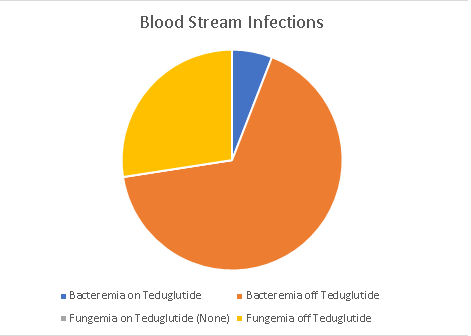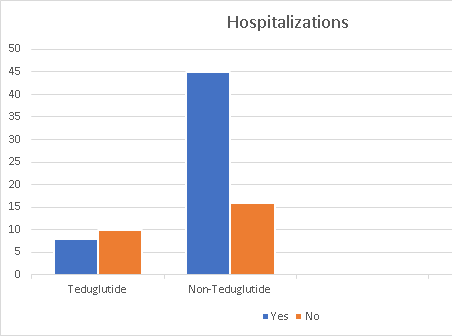Teduglutide Therapy in Real World Setting is Efficacious in Reducing Complications in Short Bowel Syndrome
1Internal Medicine, Henry Ford Hospital, Detroit, MI, 2Gastroenterology and Hepatology, Henry Ford Hospital, Detroit, MI, 3Transplant Surgery, Henry Ford Hospital, Detroit, MI
Meeting: 2020 American Transplant Congress
Abstract number: C-324
Keywords: Adverse effects, Infection, Safety, Short gut syndrome
Session Information
Session Name: Poster Session C: Small Bowel: All Topics
Session Type: Poster Session
Date: Saturday, May 30, 2020
Session Time: 3:15pm-4:00pm
 Presentation Time: 3:30pm-4:00pm
Presentation Time: 3:30pm-4:00pm
Location: Virtual
*Purpose: Teduglutide, a GLP-2 analogue, increases portal and intestinal blood flow thereby increasing absorption of fluid and nutrients. We evaluated outcomes of Teduglutide therapy for short bowel syndrome (SBS) in a single center.
*Methods: 98 patients in our intestinal rehabilitation clinic diagnosed with SBS were retrospectively identified through chart review from 1/2010-12/2019. Data was collected on cause of disease, demographics, therapy, symptoms and clinical complications. Data was obtained for infection, mortality, rate of hospitalization, incidence of cancer, kidney injury and progression to intestinal transplant. Patients started on Teduglutide were further examined for success of treatment defined as weaning off IVF or TPN by more than 2 days per week. T-test and Chi-Square analysis was used for categorical variables and analysis of variance (ANOVA) was used for continuous variables.
*Results: A total of 98 patients were included in our study. Mean age was 53.2 years (range 20-80) with 66% females. 19 patients (19.6%) were started on Teduglutide. Teduglutide was associated with a significantly decreased risk of hospitalizations (44.4% vs 73.8%, p = 0.020) and was not associated with significant change in risk of acute kidney injury (4% vs 29%, p=0.172), colon polyps (0% vs 6%, p=0.653), colon cancer (2% vs 6%, p=0.653) and overall mortality (13% vs 2%, p=0.822). Bloodstream infections were statistically reduced in those on Teduglutide (15.8% vs 44.3%, p=0.02). Fungaemic events were reduced on Teduglutide (0% vs 17.8%). The rate of any infection requiring hospitalization in the Teduglutide group was 33% vs 57% without (p=0.185). 77.78% of patients started on Teduglutide achieved treatment success.
*Conclusions: Our study shows Teduglutide as a safe and effective medication used in the treatment of SBS, it decreases the risk of hospitalization by almost two-fold with no increased risk of kidney injury, polyps or colon cancer. It reduces the incidence of fungemia, blood stream infections as well as number of infections requiring hospitalization.
To cite this abstract in AMA style:
Ashraf T, Mendiratta V, Ghanimeh MAbu, Abdulla H, Nagai S, Beltran N, Jafri S. Teduglutide Therapy in Real World Setting is Efficacious in Reducing Complications in Short Bowel Syndrome [abstract]. Am J Transplant. 2020; 20 (suppl 3). https://atcmeetingabstracts.com/abstract/teduglutide-therapy-in-real-world-setting-is-efficacious-in-reducing-complications-in-short-bowel-syndrome/. Accessed February 18, 2026.« Back to 2020 American Transplant Congress


